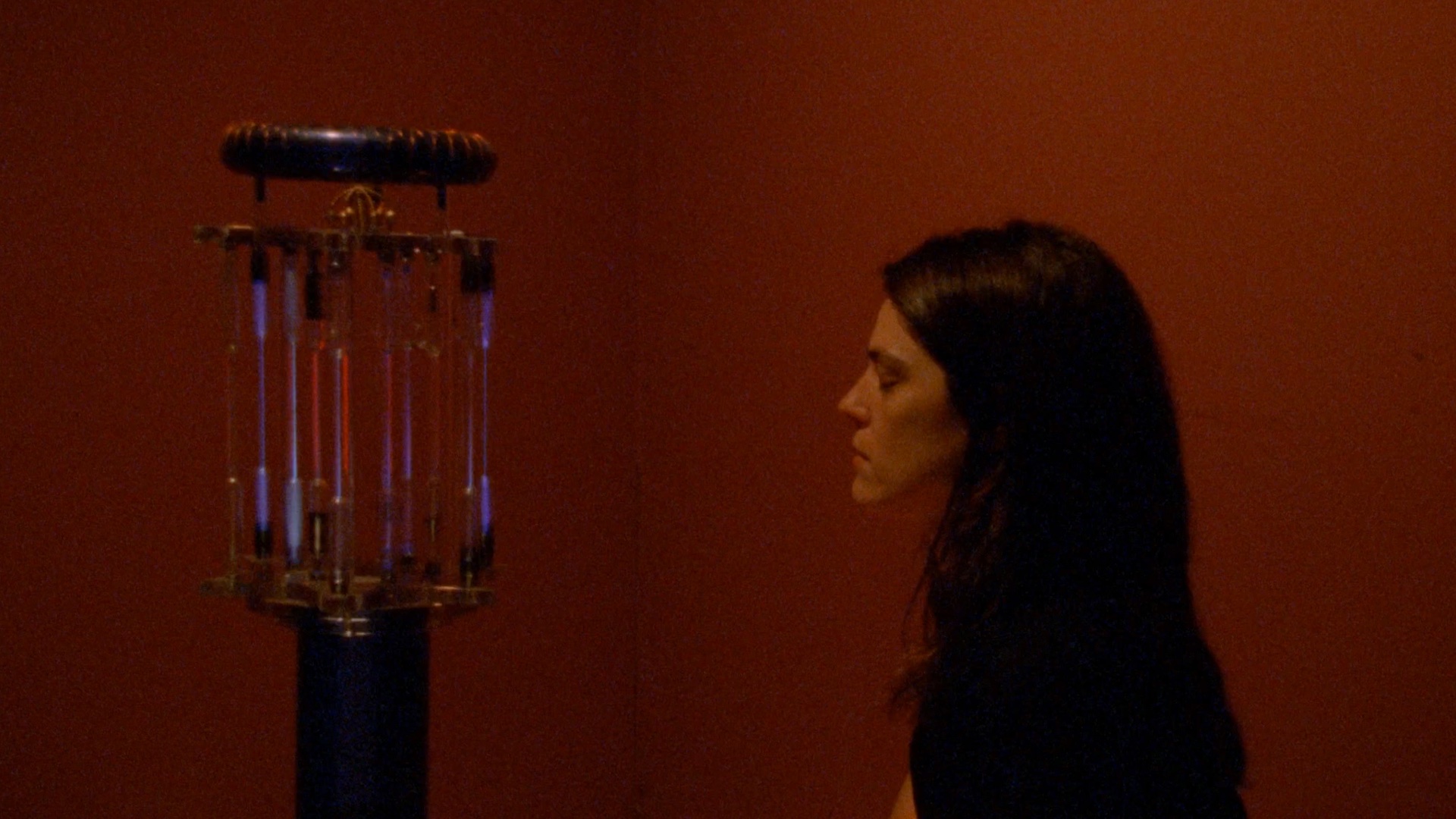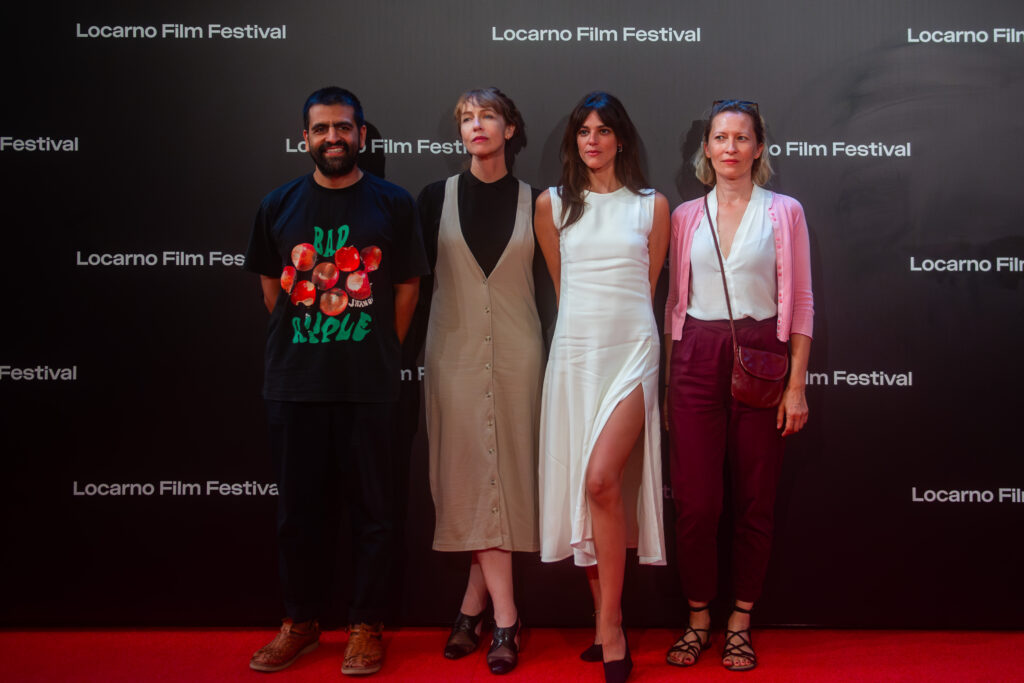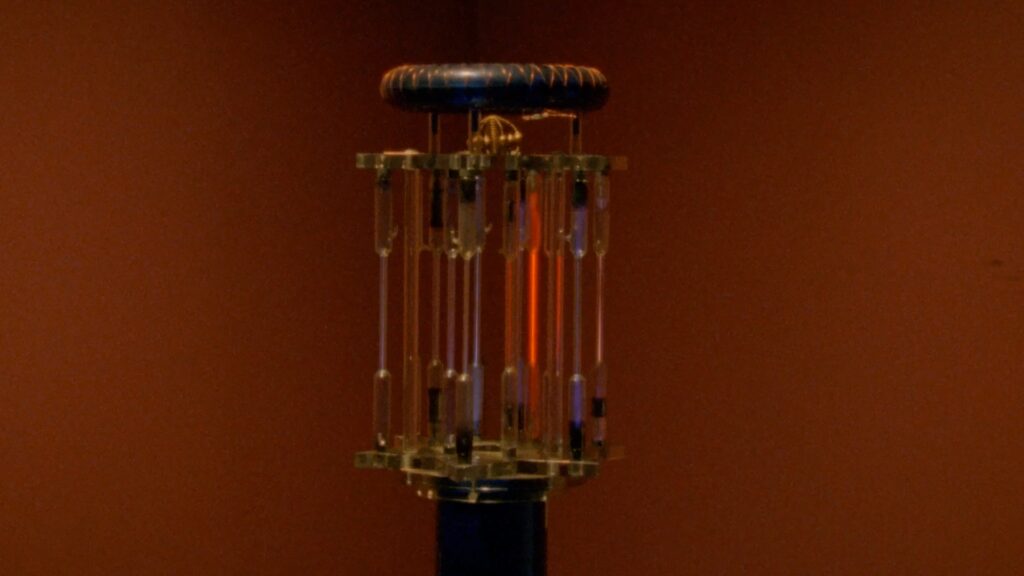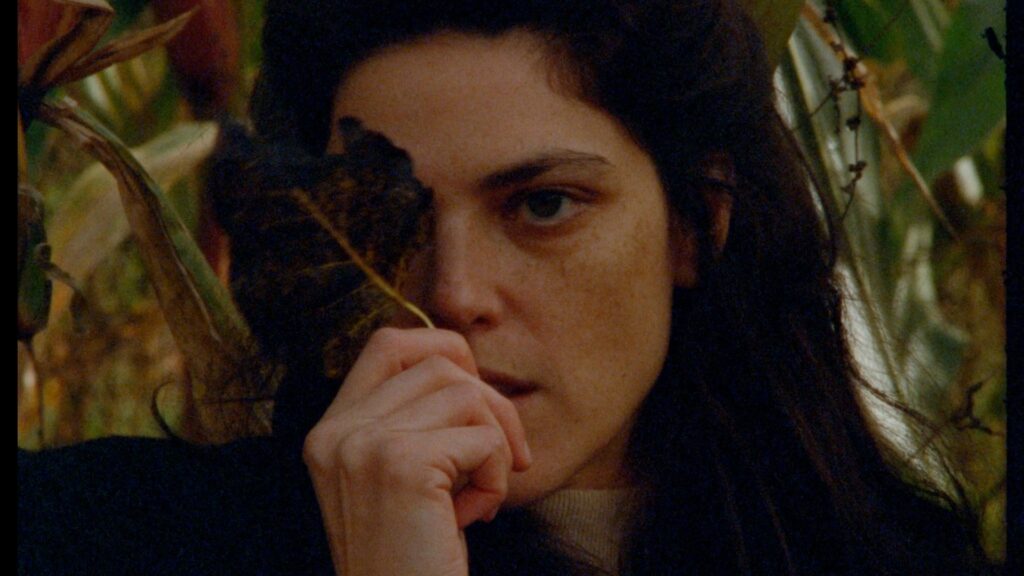Interview with Courtney Stephens and Callie Hernandez about the film, “Invention” Locarno Film Festival 2024

One of the most complex and sophisticated films in Locarno’s Cineasti del presenti competition this year was the American independent movie “Invention,” co-created by Courtney Stephens and Callie Hernandez who also plays the lead role. That the film is such an outstanding creative endeavour is not surprising since both filmmakers have impressive bios and extensive experience behind them.
Having studied medical anthropology, Courtney Stephens is a filmmaker interested in the shape of knowledge and belief systems and in how people participate in the belief systems and fantasy lives of those they love. She often works with found elements, exploring the unconscious currents running within various media such as advertisements, home movies, and the news. “The American Sector,” her documentary (co-directed with Pacho Velez) about fragments of the Berlin Wall transplanted to the U.S., was named one of the best films of 2021 in The New Yorker. Her essay film, “Terra Femme,” composed of amateur travel footage shot by women in the early 20th century, was a New York Times critic’s pick and premiered at the Museum of Modern Art. It has toured widely as a live performance. Her films have been exhibited at The National Gallery of Art, The Barbican, BOZAR, BAMPFA, Eye Filmmuseum, Royal Geographical Society, Walker Art Center, the Thailand Biennale, and in film festivals including the Berlinale, Viennale, IDFA, Hong Kong, SXSW, and the New York Film Festival. She is the recipient of a Guggenheim Fellowship, a Fulbright Scholarship to India, and fellowships from MacDowell, Yaddo, and the Wexner Center. She is a graduate of the AFI, and previously worked as an assistant to Terrence Malick.

Callie Hernandez is an actress, writer, filmmaker and producer with work spanning over a decade. Her first role as an actress was in Terrence Malick’s “Song to Song” followed by Ridley Scott’s “Alien: Covenant,” Damien Chazelle’s “La La Land,” Pete Ohs’s “Jethica,” HBO Max’s “The Flight Attendant,” Alan Palomo’s “Meutrière” in collaboration with Sean Price Williams, and A24’s “Under the Silver Lake” among many others. In 2022, she founded Neurotika Haus Films, an in-house film studio, which yielded “Invention,” Pete Ohs’s dark comedy “Untitled Tick Movie” — in which she acted, wrote and produced alongside Jeremy O’ Harris — and Olivia Erlanger’s “Appliance,” which premiered at CAMH in April 2024. Hernandez made her stage debut in Erlanger’s experimental play “Humour in the Water Coolant” at ICA London in June 2024. She was also an attendee at Oxbelly 2024. Upcoming film work includes Albert Birney’s “OBEX” (2025), James N. Kienitz Wilkins’s “The Misconceived” (2025) and Neurotika Haus Films’s “Untitled Erotica” anthology series (2025).
“Invention” is slightly experimental in form and has a very absorbing story and character at its center. It’s a unique piece of autofiction since the filmmakers used elements and experiences from their own lives and blended and transformed them into something new and surprising, a film that is probing realms beyond those immediately apparent on the screen. These realms and experiences relate to the process of grieving the loss of a complicated, allusive parent while being confronted with the bureaucratic aftermath of such an event, which can sometimes lead to moments of delicious dark comedy.
In Locarno “Invention” picked up the best acting award in its respective section, the Cineasti del presenti competition. The following interview is with both Callie Hernandez and Courtney Stephens who kindly shared their thoughts and processes behind the making of this film.
Dana Knight: From the very first frame — a funeral home worker’s attempts to choose the right musical soundtrack for the service — the film draws attention to its form. I found the film complex and sophisticated and I loved the way it inserts its own subjectivity by breaking with the performance at times. Was it difficult to find the right tone, the right structure for this film and how did you go about it?
Courtney Stephens (CS): Thank you so much. It was a lot of fun but also a challenge trying to puzzle it all together; the fiction story but also the real experiences it was drawn from, and the larger questions behind the film. We first assembled the fiction scenes, then worked on pulling them open, inserting archive or abstract passages or audio from the production of the film. We wanted to open the seams. It was also an experiment to see what a fairly simple story about personal grief could hold as far as larger forms of grief: residues of the past, ideas about the country, shifts in public affect. But we never wanted to lose sight of it being something that we had glued and stitched together to make sense of personal loss.
DK: I know you both went through similar life experiences of loss and grief, is the father in the film a composite father figure?
Callie Hernandez (CH): Many elements are pretty close to my actual father — the doctor in the archive in the film is my actual father. The machines belonged to him. His journals and books and the blue glasses that are in the film all belonged to him. The interactions I’d had with his patients and clients are closely mirrored in the film. Courtney’s dad was in business. So, the narrative points regarding patents and things are more from her father. And then, of course, all these things were fictionalised — some slightly, some altered completely.
CS: Yes, we framed the real archival TV clips in the film to pull them into the fiction story, so they suggest he was involved with developing his own devices and gadgets, so even the archive is being folded into the fiction. I had had some experience trying (and failing) to salvage my dad’s business after his death, so we drew from that, but I think we were also pointing towards a father figure that is more universal: the parent you never fully know, and how hard it is to let go of someone when you still have unanswered questions.
DK: Carrie doesn’t seem to know her father very well, and the film is structured as a epistemological journey, a daughter’s quest for parental truth, inviting other people’s points of view along the way and trying to navigate as best she could this sea of beliefs, perceptions, opinions. “The world is built on belief” and truth is not easy to get to, did the filmmaking process elucidate anything for any of you, did it bring any insights?
CH: The most surprising insight I found was in terms of examining the concept of ‘conspiracy’ itself. I was pretty heavily researching things like ‘Ong’s Hat,’ which was one of the first well-known internet-based conspiracy theories. My dad was pretty into reptilians and Pizza Gate and things of that nature. But some conspiracy theories turn out to be true. Others, not so much. I was more curious about the psychological origins of conspiracy as a whole, which, then, calls into question the concept of ‘belief,’ and then, of course, the origins of ‘miracles.’ All of this seemed to tie back to grief in some way. A sense of total loss.

DK: The electromagnetic healing device looks like a mad scientist’s invention, like a science fiction prop. I assume this is the film’s “invention” and not an actual health gadget/prototype? (Although that wouldn’t surprise me!) How did you go about building it or is it a found object? The red background suggests this could potentially be a very dangerous object…
CS: The origin of the device you see is one of the movie’s secrets.
CH: These are the actual types of medical machines my dad owned and collected. I found a lot of my dad’s devices to be really beautiful and sculptural. They range in price anywhere from $2k-$17k. There’s a market for these types of medical devices, absolutely. They definitely exist.
DK: The film is very skeptical in its attitude towards the alternative medicine field, mainly because we align our gaze with that of Carrie’s, whose sardonic smile gives us a very clear indication of her thoughts…Was this what you tried to convey?
CH: Courtney is less skeptical in this way, probably. For me, growing up around it — it was like being part of the experiment as a child. Being hypnotized, or being utilized in varied forms of energy work, Reiki or NLP, or watching my parents break arrows with their necks during a Tony Robbins conference; it’s maybe not as fun as it seems. It’s a lot of probing at such a young age. We did make the choice that Carrie was more estranged from her father than I was. But being uncomfortable and not knowing how to process his death, how to navigate these interactions, results in a certain cynicism. She doesn’t know what to believe. Then, as the film goes on, and she’s processing, she loosens her grip on the yarn and things begin to unravel.
CS: I think our hope is that the invention becomes a cipher for the inner world of a parent and their personal belief system. You try to find resolution in a world associated with the missing person, you try it on. As far as my feelings about medicine, I majored in medical anthropology as an undergrad and I’ve always been interested in this stuff. It’s pretty obvious that the American system is cruel and and deserving of critique. And sometimes it feels as though alternative health trends are there to call attention to the limits of the mainstream system. But I’ve also had some incredible experiences outside the realm of so-called normal medicine.
DK: The film is an indirect portrait of contemporary US. Using the pretext of the patent, the film gives us access to an array of professions (lawyer, salesman, investor, insurance people) and other “players,” providing us with a very clear image about how the system works and what the pervasive philosophy is: “Ideas are as valuable as the products you can turn them into”. Who are the film participants, how did you find them and did you work together on their lines of dialogue or were such insights completely their contribution?
CH: It was pretty collaborative. Much of the dialogue was provided, especially with James’s scene, which involved a lot of legal jargon. But the filmmakers and poets and actors that perform in the film definitely contributed their own ideas as well.
CS: Great question. There are a few non-actors in the film, who draw from their own expertise and ways of thinking about value — I’m thinking especially about the fellow who fixes clocks, who actually owned the antique store we shot at. It was great hearing him talk about inventions that matter — like clocks. Generally, we were always thinking about systems of value and systems of belief — and how these two things intersect for each character. The invention carries this unknown value and brings out people’s hopes and also their greed, in different proportions. I guess any esoteric or abstract concept will get instrumentalized eventually, but I don’t think we’ve ever been so desperate to believe in something as a country.
DK: For the antique shop dealer, the healing device is just another object: “I’m a salesman, I sell objects, this is what I do.” This line is painfully cynical. Will you share your thoughts about American capitalism and the state of the country in general?
CH: This kind of goes back to the realization that origins of conspiracy and belief stem from a sense of hopelessness, or hoping for a miracle. Or wanting, so badly, for something that appears to be true to, in fact, not be true. There’s always a longing at the center, like the belief that you might wake up to find all the taxes you ever paid, returned to you, would be nothing short of miraculous. It’s a deep hope that something could be undone, reversed, the loss, returned. So, this realization was what turned our attention to what was occurring on a grander scale. Hopelessness, then, seemed to be a marker of a national (and international) crisis. And the idea of ‘invention’ seemed to offer a solution; a dream.
DK: There is a disparaging comment and even suspicion about “small money people” in the film, as opposed to “big money people,” or “Big Tech.” Of course it is well known that the American class system is articulated mainly around financial wealth, but did this remark surprise you at all? Did anything the film participants say surprise you?
CS: Yes, we were always trying to figure out what drove each person, in their societal position, to care about this idea. Each character has their own incentive for having gotten involved with the invention, just as each character has their own pseudo-conspiracy that they blame for their circumstances. Big Tech believes in the purity of its vision while the “small money” manufacturer blames the rise of foreign manufacturing. Ultimately, they all orbit around the same bottom line, but friction arises from different financial logic — there’s the logic of industry, the logic of the market, or the new-horizon logic of tech and speculation. As Tony says in the film, money is the real conspiracy.
CH: Someone was watching conspiracy videos on YouTube, on repeat. They’d watch for hours. At one point, another person asked, “why do you watch all of that?” The response was, “I’m just hoping that one of these things might actually, one day, be true.” That was one of the most enlightening moments for me while making this. In terms of financial class systems, I wouldn’t say anything was all too surprising to be honest.

DK: The film talks about invention as much as about “reinvention”, and the fact that Carrie’s late father went to settle down in a place that welcomes those looking to reinvent themselves throws even more doubt on his character and intentions. Do you see the concept of reinvention as part of the American Dream?
CH: Absolutely. Reinvention has the same appeal as something along the lines of reincarnation; you get the chance to come back, to return in new form. It’s a wonderful promise. A phoenix rising from the ashes. Our society is marked by loss and the promise of something better. Mythology and clichés alike have been braided into the culture.
CS: Yes, I second that. We were thinking a lot about reinvention in terms of names. There’s Dr. Fernandez who holds accounts under numerous fake names. The names of the characters are also riffing on the names of the actors, which was not just a wink. The American Dream says that opportunity will transform you, but as opportunities are taken away, one is left to slip between fictions.
DK: If this movie-making business stopped making sense for you overnight, what would you reinvent yourselves as? 😉
CS: The movie business has already stopped making sense, but I haven’t come up with anything else.
CH: I’m afraid I’ve thought about this a lot in the past few years. I don’t know. I really don’t. I’d probably turn to full time gardening and farming.
